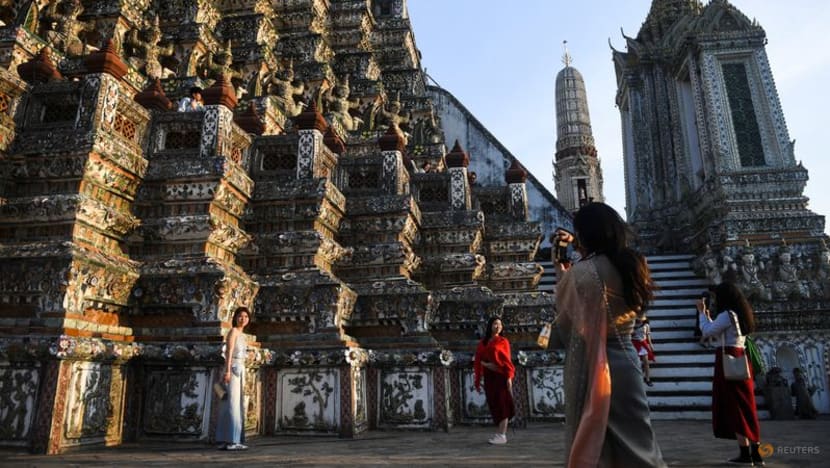CNA Explains: What is an ETA and why are more countries like Thailand implementing it?
More ETAs mean fewer spontaneous trips, said industry experts.


This audio is generated by an AI tool.
SINGAPORE: Thailand is moving towards implementing a mandatory electronic travel authorisation (ETA) system for visa-exempt travellers.
This would likely mean that citizens of 93 countries who enjoy visa-free entry into the Land of Smiles – including Singapore – would have to apply for an ETA on an online portal before their trip.
It has been reported that a pilot scheme for Thailand's ETAs would begin in December, but a spokesman for the country's Ministry of Foreign Affairs said on Thursday (Sep 19) that the authorities are discussing the best format for such a system as well as the timeframe for implementation.
But what exactly is an ETA and why are more countries implementing this?
What is an ETA?
An ETA is a form of pre-screening for visa-exempt travellers into certain countries, said Mr Aaron Wong, founder of travel website The MileLion.
He said an ETA is different from a visa as it is more for short-term stays and is generally less onerous to apply for.
“Unlike traditional visas, which typically involve interviews, lengthy forms, and in-person visits to consulates, ETAs are typically applied for online and granted within a shorter timeframe,” he said.
ETAs can be granted within a few hours and sometimes even within minutes.
ETAs are also electronically linked to a traveller's passport, to be used for short tourist or business trips, while visas are for longer stays with a specific purpose such as employment or studies, said Mr Wong.
Which countries are implementing the ETA system?
Countries that have long had ETAs include Australia, Canada, and the United States, where it is called the Electronic System for Travel Authorization (ESTA).
Other than Thailand, several countries this year have made plans to implement the system.
From Jan 8 next year, Singaporeans and other non-European nationalities visiting the UK will need an ETA. Europeans will need one from Apr 2.
Japan also has plans to introduce its own ETA, according to travel site visasnews.com.
The European Union is preparing to launch a new border management initiative called the European Travel Information and Authorisation System (ETIAS), a new entry requirement for travellers who do not need a visa to enter 30 European countries for a short stay.
Why are more countries implementing an ETA?
A variety of reasons – one of which is security. Countries can use ETA applications to assess travellers' health, criminal records and travel history, for example.
“Just because you have a visa-free travel arrangement with another country doesn’t mean that every individual of that country is trustworthy,” said Mr Wong.
Another reason to implement an ETA is so countries can collect fees from each visitor, since most ETA applications come with an administrative charge.
“For countries that have tourism fees like the United States and New Zealand, the ETA is a simple way of collecting it,” he said.
The government fee for an Australia ETA is A$20 (US$13.50), while the US charges US$21 and the UK £10 (US$13.20).
New Zealand's ETA fee is NZ$17 (US$10.60) but it also imposes a tourism levy of NZ$35, which is increasing to NZ$100 from October.
Thailand is reportedly not charging a fee for its ETA.
Aside from collecting more revenue, having an ETA also simplifies the entry process at immigration checkpoints, said Mr Joni Herison, managing director of travel agency Druk Asia.
“By handling pre-arrival checks electronically, countries can reduce wait times and administrative burdens at immigration checkpoints, making the process more efficient for both travellers and border control officials,” he said.
Could Singapore launch its own ETA too?
Mr Herison said that Singapore’s current SG Arrival Card, which was implemented during the COVID-19 pandemic to screen incoming travellers’ health status, “closely resembles an ETA” in how it collects information for immigration clearance.
However, it differs from an ETA as it is for every traveller at air and sea checkpoints, including Singapore residents.
Mr Wong said that Singapore is unlikely to implement an ETA.
“It’s a bit more difficult for a country like Singapore to have this requirement, given that our entire economy is dependent on the free movement of goods and people,” he said.
Will implementing an ETA hurt a country’s tourism industry?
Assistant Professor in Human Geography Zhang Jiajie said that in general, a “borderless world” ideology is increasingly obsolete.
“Seamless travel is bound to take a backseat to the priority placed on securitisation of the border in the name of national security,” said Dr Zhang, who is from the National Institute of Education at Nanyang Technological University.
Other than security concerns, countries are becoming more selective with the kind of visitors they want to attract, Mr Wong said.
For instance, an ETA fee may deter young backpackers who may stay a long time in the country but not spend much money, unlike wealthier tourists.
“There’s a general move towards higher-value tourism,” he said.
He added that larger countries have a domestic tourism market, and so may not depend heavily on foreigners to boost tourist revenue.
Overall, countries are now making a cost-benefit analysis on how they approach tourism, and some are choosing the more selective approach.
“Countries that have decided to introduce the ETA would have determined that the benefits for erecting a more stringent e-border outweigh the opportunity costs,” said Dr Zhang.
What should travellers take note of?
What this means for travellers is fewer spontaneous trips, said the industry experts.
“Although the approval process is generally quick, often within 24 hours, travellers must ensure they have essential documentation, such as proof of accommodation and a return ticket, prepared,” said Mr Herison.
“This shift encourages earlier itinerary planning and may reduce last-minute flexibility.”
Mr Wong said that travellers can search travel sites such as joinsherpa.com to find out what documents are required based on their nationality and their travel destination before they book a trip.
However, he also cautioned against a growing number of scam sites that masquerade as ETA application platforms, that can cheat travellers of the ETA application fee.
“Schemes like this invariably give rise to scams, impersonation sites, and the onus is on the individual to make sure that they are visiting the official site,” he said.
Editor's note: This article has been updated to include the Thai government's clarifications on reports that the country would introduce ETAs in December. It said that the format for such a system and the timeframe for implementation is still being considered.

















